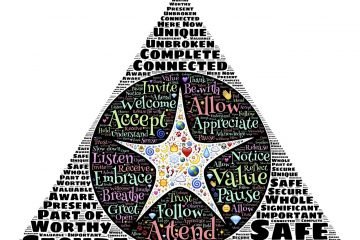Click below to listen to this article:
What is wellbeing?
Wellbeing, or wellness, is a multidimensional concept that encompasses various aspects of human flourishing, such as happiness, meaning, satisfaction, and health. self-transcendence is a psychological state that involves going beyond one’s personal boundaries and ego, and connecting with something greater than oneself, such as nature, humanity, spirituality, or a higher purpose.
Wellbeing and self-transcendence
The relationship between wellbeing and self-transcendence is complex and bidirectional. On one hand, self-transcendence can enhance wellbeing by providing a sense of coherence, belonging, purpose, and fulfilment. For example, people who engage in altruistic behaviours, such as volunteering or donating to charity, often report higher levels of happiness and life satisfaction than those who do not. Similarly, people who experience awe, gratitude, or love for something or someone beyond themselves tend to have more positive emotions and lower levels of stress and depression than those who do not.
On the other hand, wellness can facilitate self-transcendence by creating the optimal conditions for expanding one’s awareness and perspective. For example, people who have high levels of psychological wellbeing, such as self-acceptance, autonomy, and personal growth, are more likely to seek out and embrace new experiences and challenges that can foster self-transcendence. Likewise, people who have high levels of physical wellness, such as health, fitness, and vitality, are more capable of engaging in activities that can induce self-transcendence, such as meditation, yoga, or nature exploration.
Wellbeing and self-transcendence are interrelated and mutually reinforcing aspects of human development. By cultivating both dimensions of wellbeing and self-transcendence in our lives, we can achieve a higher level of integration and harmony within ourselves and with the world around us.
Wellbeing and personal resilience
In addition, wellbeing and personal resilience are two interrelated concepts that have important implications for individuals and organizations. It is also the state of being comfortable, healthy and happy, while personal resilience is the ability to cope with stress, adversity and change.
The relationship between wellness and personal resilience is bidirectional: on one hand, wellbeing can enhance personal resilience by providing a positive outlook, a sense of meaning and purpose, and a supportive network of relationships. On the other hand, personal resilience can improve wellbeing by helping individuals to overcome challenges, learn from failures, and adapt to new situations.
Therefore, both wellness and personal resilience are essential for achieving optimal performance and satisfaction in life and work. By investing in wellbeing and personal resilience, individuals can increase their physical, mental and emotional health, as well as their productivity, creativity and engagement. Likewise, organizations can benefit from fostering a culture of wellness and personal resilience among their employees, as this can lead to lower absenteeism, turnover and burnout, as well as higher morale, loyalty and innovation.
Effect of mindset on wellbeing
One of the factors that can influence our health and wellbeing is our mindset. How we think about ourselves, our situations, and our future can have a significant impact on our physical and mental health. In this section, we will discuss the impact of belief and positivity on wellness, and provide some examples from placebo studies to show that believing in one’s own vitality actually helps one’s own vitality.
Belief and positivity are related to the concept of optimism, which is the tendency to expect positive outcomes and focus on the bright side of life. Optimism has been linked to many benefits for health and wellbeing, such as reduced stress, increased immunity, improved wellness, and better resilience (Cherry, 2023). According to Seligman (2008), positive health is a new field that focuses on enhancing health along with curing illness to bring about wellbeing.
One of the ways that belief and positivity can affect wellness is through the placebo effect. The placebo effect is the phenomenon in which a person’s expectations or beliefs influence their response to a treatment or intervention, regardless of its actual efficacy. For example, if a person believes that a sugar pill will relieve their pain, they may experience less pain after taking it. The placebo effect can also work in the opposite direction, known as the nocebo effect, in which a person’s negative expectations or beliefs worsen their response to a treatment or intervention.
Placebo studies have shown that belief and positivity can have powerful effects on various aspects of wellness, such as pain, depression, anxiety, fatigue, and immune function. For instance, a study by Kaptchuk et al. (2010) found that patients with irritable bowel syndrome who received placebo pills with positive information about their effectiveness reported greater improvement in their symptoms than those who received no treatment or placebo pills with neutral information. Another study by Colloca et al. (2013) found that patients who received positive verbal suggestions before surgery had lower levels of postoperative pain and inflammation than those who received negative or neutral suggestions.
These studies suggest that belief and positivity can modulate the perception and processing of pain and other sensations in the brain, as well as influence the release of neurotransmitters and hormones that affect mood and immunity. As Benson (1995) stated, “Remembered wellness is not just an idea; it is a physiological reality.”
Therefore, belief and positivity can have a profound impact on wellness by shaping our expectations, emotions, behaviours, and physiological responses. By cultivating a more optimistic outlook and focusing on the positive aspects of life, we can enhance our health and well-being and cope better with challenges and adversity.
Does self-transcendence lead to increased wellness?
self-transcendence is the phenomenon of experiencing one’s self as expanding both backward and forward in time; a feeling of connectedness to all of humanity, the earth, and the cosmos; and a turn toward existential concerns such as the meaning of life and future death (Reischer, Roth, Villarreal & McAdams, 2020). It is often considered the highest human need and the realization of one’s full potential (Maslow, 1969). self-transcendence has been linked to positive outcomes such as greater wellbeing, positive emotions, optimism, higher self-esteem, greater self-integration, and enhanced life purpose, and with lower depression and neuroticism (Reischer et al., 2020). It is also a salutogenic process that helps people cope with vulnerability and find meaning in life (Reed, 2021).
One way to discuss the relationship between self-transcendence and perceived wellness is to examine how people narrate their lives and express their self-transcendence through stories. Reischer et al. (2020) identified six elements of self-transcendence in life narratives: cosmic connection, transpersonal connection, temporal integration, generativity, ego integrity, and symbolic immortality. These elements reflect how people connect with something greater than themselves, integrate their past, present, and future selves, contribute to the next generation, accept their life as meaningful, and transcend their mortality. The authors found that these elements were positively associated with wellbeing indicators such as life satisfaction, happiness, purpose in life, personal growth, and ego development.
An example of a life narrative that illustrates self-transcendence and perceived wellness is the following:
“I feel like I’m part of something bigger than myself. I believe that there is a divine plan for me and that everything happens for a reason. I also feel connected to nature and the universe. Furthermore, I like to meditate and pray and feel the presence of God in my life. I think that my life has a purpose and that I’m here to make a difference in the world. I try to help others whenever I can and to be a good role model for my children and grandchildren. Likewise, I’m proud of what I have accomplished in my life and I have no regrets. I accept myself as I am, and I’m grateful for everything I have. I’m not afraid of death because I know that my soul will live on after my body dies. Not only that, but I think that death is just a transition to another state of being.” (Reischer et al., 2020, p. 17)
This narrative shows how the person expresses cosmic connection (feeling part of something bigger than oneself), transpersonal connection (believing in a divine plan), temporal integration (integrating past, present, and future selves), generativity (helping others and contributing to the next generation), ego integrity (being proud of one’s life and having no regrets), and symbolic immortality (believing that one’s soul will live on after death). These elements suggest that the person has a high level of self-transcendence and perceived wellness.
self-transcendence is a phenomenon that can enhance one’s perceived wellness by expanding one’s sense of self, connecting with something greater than oneself, finding meaning in life, and transcending mortality. It can be expressed through various elements in one’s life narrative that reflect one’s values, beliefs, goals, and achievements.
Further reading
Here are some links that can help promote psychological wellness:
The NHS has a list of top tips to improve your mental wellness
References
Benson, H. (1995). Timeless healing: The power and biology of belief. Scribner.
Cherry, K. (2023). Benefits of positive thinking for body and mind. Verywell Mind. https://www.verywellmind.com/benefits-of-positive-thinking-2794767
Colloca, L., Ludman, T., Bouhassira, D., Baron, R., Dickenson, A.H., Yarnitsky, D., Freeman R., Truini A., Attal N., Finnerup N.B., Eccleston C., Kalso E., Bennett D.L., Dworkin R.H., & Raja S.N. (2013). Neuropathic pain. Nature Reviews Disease Primers 14(4), 14-25.
Kaptchuk T.J., Friedlander E., Kelley J.M., Sanchez M.N., Kokkotou E., Singer J.P., Kowalczykowski M., Miller F.G., Kirsch I., & Lembo A.J. (2010). Placebos without deception: A randomized controlled trial in irritable bowel syndrome. PLoS One 5(12), e15591.
Seligman M.E.P. (2008). Positive health. Applied Psychology: An International Review 57(s1), 3-18.
Maslow, A. H. (1969). The farther reaches of human nature. Journal of Transpersonal Psychology, 1(1), 1-9.
Reed, P. G. (2021). self-transcendence: A salutogenic Process for Well-Being. In M. B. Mittelmark & G. F. Bauer (Eds.), The Handbook of Salutogenesis (pp. 103-110). Springer.
Reischer, E., Roth, M., Villarreal, Z., & McAdams, D. P. (2020). self-transcendence in Life Narratives: A Mixed-Methods Approach to Well-Being in Late Midlife Adults. Journal of Personality.





0 Comments